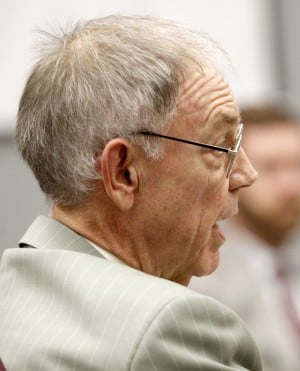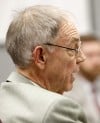Police: Jack Pursel told Charles Manson disciple about murders 20 years ago
WATERLOO, Iowa --- Twenty years before he showed up at the Waterloo Police Department to admit to an unsolved 1981 double slaying, Jack Wendell Pursel confessed his crime to a member of the "family" of convicted mass murderer Charles Manson.
Pursel, a 66-year-old retired truck driver from California, pleaded guilty Thursday to two counts of murder in the torture deaths of Robert and Goldie Huntbach. The plea came about a month after he confessed to investigators in May.
But, even though Pursel didn't fight the criminal charges, detectives had to do their legwork to make sure they had the right man and to ensure they could get a conviction had he decided to take the case to trial.
Investigators pored over old reports and records to make sure details Pursel remembered were things only the killer would know. They traveled to California to visit Pursel's old haunts.
And they met with a former member of Charles Manson's cult, Bruce Davis, who is serving life in prison for taking part in two murders on Manson's orders.
In 1969, Davis and others killed musician Gary Hinman and ranch hand Donald Shea. Shea was suspected of being a police informer following the Tate-LaBianca murders, and Manson family members killed Hinman as they tortured him in an attempt to get him to sign over property.
Pursel met Davis while Pursel was serving time for a sex crime in California, where he fled following the Huntbach slayings.
Active in ministry in prison, Davis had preached to Pursel, police said.
"I think Davis may have been the person who brought him to Christ," said Investigator Robert Duncan with the Waterloo Police Department.
Pursel had told Davis about the killings in the 1990s, a fact that Pursel disclosed when he confessed to Waterloo police in May.
Part of the Waterloo detectives' task was to confirm this with Davis.
Davis first denied any such conversation when reached by phone, Duncan said. But then officers traveled to talk with him in person at the California Men's Colony at San Luis Obispo.
The former Manson Family member was polite but reserved, Duncan said.
"He was cordial with us," Duncan said.
Davis said he had lied on the phone and admitted Pursel had told him about the murders, but he didn't add much detail, Duncan said. Davis told the detectives he was "shocked" by Pursel's admission, and he talked of his own plans to continue ministering if he is ever granted parole.
Waterloo police also found the South Gate apartment where Pursel had lived for several years before deciding to turn himself in for the Iowa murders. It was cleaned out --- he had sold all his possessions and put the money in a bank account that was turned over to authorities for restitution this week.
Neighbors remembered Pursel but said they had little interaction with him, Duncan said. A Los Angeles-area officer recalled visiting Pursel's apartment a number of years earlier to verify his sex offender registration. Pursel was rude and cursed at him, the officer remembered.
Authorities said Pursel never lived in Waterloo but knew the Huntbachs through a relative. He took a bus to Waterloo in January 1981 as part of a plan to rob the elderly couple while he was on the run from the California sex charge. He stayed at a hotel and later recounted to police how there had been a grocery store across the street. The house was later demolished for a highway project.
After ransacking the home and killing the two --- a crime which netted about $6,000, according to prosecutors --- he flew out of Waterloo on a plane headed for Chicago.
Not long after that, Pursel was detained while hitchhiking in Wyoming and sent back to California to serve time for oral copulation with a minor.
Waterloo police had considered Pursel a suspect early in the murder investigation, but they never had enough evidence to charge him. A Los Angeles County homicide detective interviewed him in prison, and two Waterloo investigators visited him behind bars in 1983. Both times, Pursel asked for an attorney, and questioning ended.
Duncan said he was impressed at the amount of effort earlier investigators had put into the case, which generated regular work for at least 15 years after the crime.
The case file surpassed 100 pages. It was the days before DNA evidence, but officers had fumed the entire Huntbach home to search for fingerprints. Pursel would later tell police he used gloves. Police even used hypnosis in an attempt to get a witness to recall the exact words a suspect had used in a conversation, Duncan said.
When Pursel finally turned himself in in May, police talked with him for about two days, keeping him in a downtown hotel overnight.
He told police the number of gunshots and the locations of the fatal wounds, and remembered the color of a cattle prod used for torture, Duncan said.
These and other details were checked against investigative records, and officers questioned family members and even reviewed Courier archives to make sure those specifics hadn't been released to the public in earlier accounts.
As with his plea in the courtroom, Pursel's police interview often strayed into religion.
On the second day, when police told him they had enough to arrest him, Pursel said he was finished.
"I don't think he wanted to talk about the torture he had done," Duncan said.
Pursel was sentenced to two concurrent life prison sentences without the possibility of parole.





1 comment:
"Part of the Waterloo detectives' task was to confirm this with Davis.
Davis first denied any such conversation when reached by phone, Duncan said.
Davis said he had lied on the phone and admitted Pursel had told him about the murders, but he didn't add much detail, Duncan said."
Well, that says a lot about Bruce Davis. He is still a liar at least.
Is he an actual priest or minister ?
I don't really know but I think even if I were a minister or priest and someone confessed a murder to me, I would have to give up my priest-hood. I could not live with that.
Maybe Bruce is living with other knowledge of murders and maybe not but we will never know for sure because Bruce Davis is a liar for sure.
Post a Comment